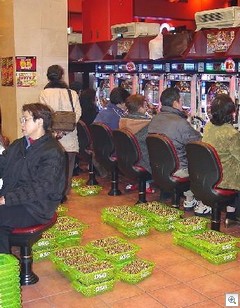 The Japanese are known in Las Vegas as “prized customers”, “top-rated quality players” and “high rollers”. Deservedly they are given first-class treatment whenever they hit the Strip. Moreover, it is well recognized that Japanese manufacturers supply some of the best gaming equipment for U.S. casinos. Japanese have even owned gambling halls in the United States. Although it is known that the Japanese people are very attached to gambling enterprise, there may be a false notion that the Japanese do not gamble very much at home. Nothing could be further from the truth. Per capita gaming in Japan far exceeds that present in the United States.
The Japanese are known in Las Vegas as “prized customers”, “top-rated quality players” and “high rollers”. Deservedly they are given first-class treatment whenever they hit the Strip. Moreover, it is well recognized that Japanese manufacturers supply some of the best gaming equipment for U.S. casinos. Japanese have even owned gambling halls in the United States. Although it is known that the Japanese people are very attached to gambling enterprise, there may be a false notion that the Japanese do not gamble very much at home. Nothing could be further from the truth. Per capita gaming in Japan far exceeds that present in the United States.
Over the years, trade journals have given only the slightest attention to the games of Japan. International gaming charts indicate that the country has lotteries and pari-mutuel racing, but no casinos. Comments on what various countries are doing regarding gaming almost always leave Japan out. In the history of the now defunct Gambling Times, there was only a short article on motor boat racing in Japan and another one on amusement machines. The leading trade journal, International Gaming and Wagering, devoted only one short survey article to Japan gaming in 1994. It would be helpful if the literature gave more attention to this gambling-intense country, perhaps in an elaboration of the 1994 piece.
Gambling, as we would call it, or entertainment with prizes, as the Japanese police would call it, is very big in Japan. Japan has 130 million people—approximately half the population of the United States. Yet the total gambling revenue of Japan is more than equal the $35 billion gross win of U.S. casinos, lotteries, and pari-mutuel racing venues.
Part of the illusion that Japan does not gamble comes from the fact that there are no casinos in Japan – that is, casinos in the U.S. sense of the word. But make no mistake about it, there are gambling halls in Japan – almost 20,000 of them. They offer players opportunities to win prizes by playing “skill” games on pachinko and pachi-slo machines. Even though there are elements of skill in pachinko, luck is a major factor in the game. Thirty million people play on the 4 million machines around the country. The machines produce wins equivalent to US$21 billion each year. In other words, the entertainment machines with prizes win more money than is won by all the casinos – commercial, Indian, and charity – of the United States.
Pari-mutuel wagering is permitted both on and off track for motorboat, bicycle, and horse racing. Japan is unique in being the only place where wagering is offered for bike and boat races. Large stadium structures permanently line banks of rivers where the boat races take place. As there is “skill” in making wagers, the government denies that there is gambling involved in the enterprise. The race betting may not be “gambling”, but make no mistake about it, it is big-time wagering. The Japan Derby (Imperial Cup) horse race each fall (November) produces a handle exceeding the collective handle of the Triple Crown in the United States.
Lotteries are in a growth phase. Until recent years, the games were passive weekly draws that were slow and did not permit the player much involvement in selection of numbers. Instant games have been played since the late 1980s, however, and in 1995 a numbers game in which the player selects the number was added. A national lottery run through the Dai-Ichi Kangyo Bank leads the world in sales for a single lottery.
|
|